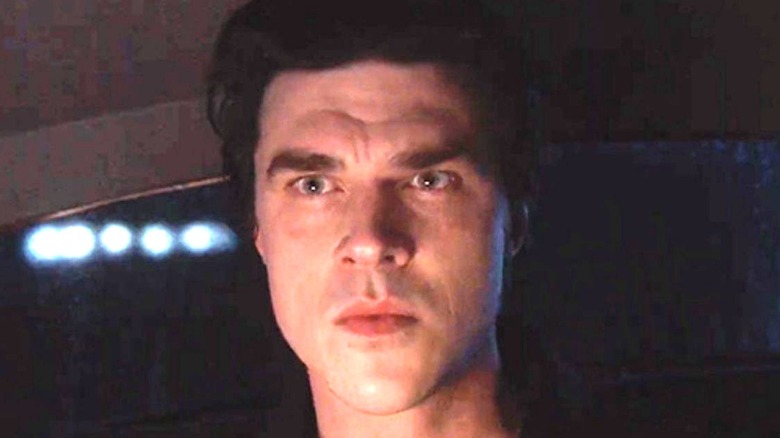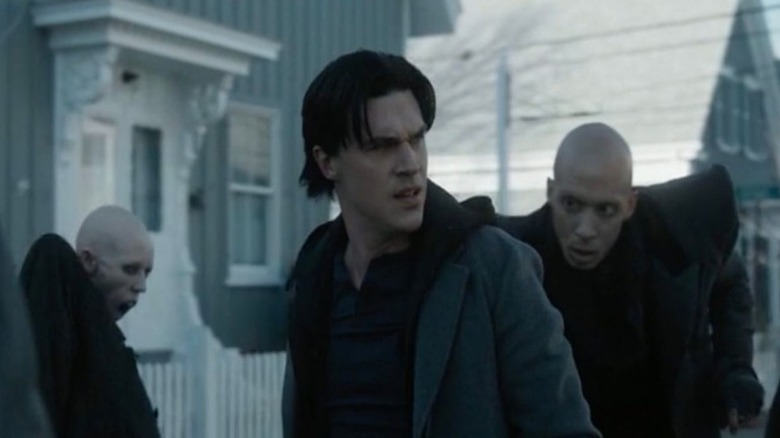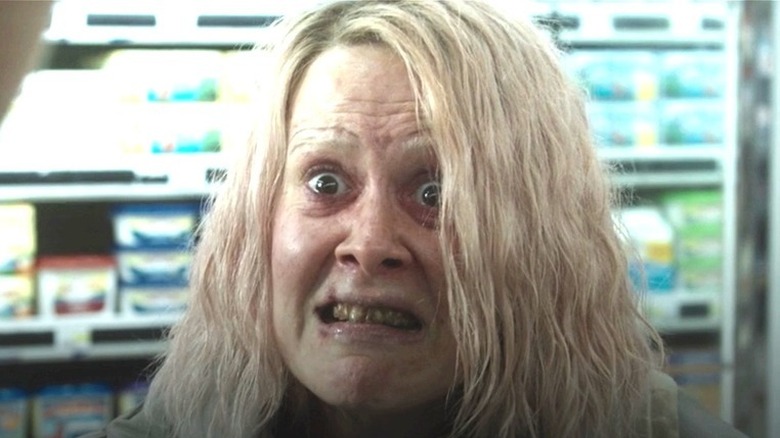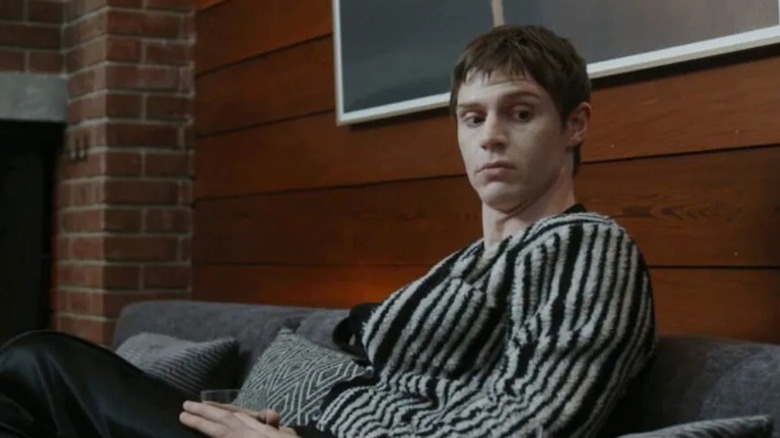The AHS: Double Feature Theory That Has Fans Looking Twice At The Pale
Warning: This article contains spoilers from episodes 1 and 2 of "American Horror Story: Double Feature."
On the other side of the premiere of "American Horror Story: Double Feature," the show's subreddit has been lighting up with theories and speculation surrounding the season's introduction of a brand-new "AHS" monster. The Pale People, as the end credits refer to them, look like an aesthetic cross between Nosferatu, a Tool video, and something out of an Alexander McQueen-designed "Mad Max" sequel starring the infamous Slender Man. With their marionette motion movements, pale skin, sunken eyes, and razor sharp teeth — not to mention their ubiquitous presence in an otherwise sleepy, off-season Cape Cod town — they are truly the stuff of nightmares. And yet, the local police (specifically Chief Burleson, who is portrayed by "AHS" vet Adina Porter) seem wholly unaware, or at least unfazed, by the threat they pose to the inhabitants of Provincetown.
A new fan theory attempts to explore these creatures' motivations and abilities, and a number of viewers feel cautiously optimistic about said theory's merits. In a recent post, Reddit user tommy-liddell wondered if maybe The Pales can smell real talent, and "only attack talented people who have not taken the black pill" (as in, the little black pill that turns talented users into financially and commercially successful artists, and untalented "hacks" into what Evan Peters' playwright Austin describes as "flesh phantoms"). Let's take a deeper look.
Can The Pales really detect talent in humans?
The original poster of this hypothesis supports their theory with an abundance of evidence, including the fact that although Harry (Finn Wittrock) is attacked by one of The Pales prior to taking the pill, they leave him alone following his transformation. Moreover, while they appeared to chase after and stalk Harry's ambitious and musically-gifted daughter Alma (Ryan Kiera Armstrong) prior to her own consumption of the drug, they keep their distance from her in the graveyard at the end of Episode 2, after she's taken it and develops the requisite side effects.
Other fans agreed that the theory that these flesh phantoms can "smell talent" made sense, and as user rapzel79 posited, "The pale ones definitely know who has taken the pill and who hasn't [...] As for smelling talent, I wonder if that's a byproduct of the pill in general." This same user suggested that "Belle and Austin can smell it too," both being users of the drug, which enables them to sniff out potential talent.
Since Belle (Frances Conroy) and Austin seem to know instinctively that Harry is a formidable writer, it's possible that developing a sixth sense for sniffing out artistic abilities is one more side effect of the drug Austin dubs "The Muse."
Building on this theory, user rotten_riot suggested it may explain Chief Burelson's apathy toward their malevolence. "Maybe this is also why Adina's character says they are inoffensive," the user hypothesized, pointing out that "the city is full of either normal untalented people or talented people who took the pill, and therefore the pale ones really have no one to bother the way they did to Alma and her father". It's a theory that certainly appears to explain the creatures' inconsistent behavior toward various townspeople, and yet, there's one Provincetown resident whose presence poses some problems for the veracity of this new thesis.
Why Don't The Pales attack TB Karen?
In Episode 2, which is (fittingly enough) titled "Pale," audiences learn that the character of Tuberculosis Karen (played by a nearly unrecognizable Sarah Paulson) is actually a talented painter. If that is the case — and if, indeed, she has not yet taken the pill — then why is it The Pales don't go after her the way they went after Harry and Alma?
After pointing out this hole in the conjecture, user malkie0609 wondered if "Maybe her TB scared them off?" While some fans quickly agreed to this explanation of the loophole, others suggested that maybe Karen was the result of an early version of the pill gone wrong. "Hear me out," said fellow user immaterial_lover_boy, "what if TB Karen is sick because The Chemist tested the pill on her before mastering the formula?"
Finally, while others pointed out that TB Karen clearly has some sort of deal going on with Belle that may explain her resistance to the creatures, still others suggested that what we think we know about The Pales may not, in fact, be true at all (which, given that this is "AHS," is believable enough). Although Harry is told by Austin that the creatures are the result of untalented "dreamers" who took the pill, user rapzel79 thinks this might be another one of creator Ryan Murphy's famous tricks, suggesting that the real difference between those for whom the pill works and those for whom it doesn't has nothing to do with talent. As the user phrased it, "maybe [...] the pale people only kill animals. This would go with the theory (that) pale people might have become pale by not killing humans ... like maybe that's the difference and not talent."
How does this theory tie into the greater "American Horror Story" narrative?
In every season of "American Horror Story" thus far, Ryan Murphy has always found a way to remind us that the real monsters are actually our own very human inner demons. So it stands to reason that if user rapzel79 is correct, it would line up with the series' consistent themes and ethos, both of which are rather deliberately laid-out by Austin in his casual philosophizing about the side-effects of the pill: "Metaphorically?" he asks, as he attempts to answer Harry's question about the pill's induction of blood thirst in its users, "maybe something about, uh, artists stealing other people's lifeblood to inspire our work."
In the decade since "American Horror Story" first premiered, the show has been turning tropes on their head and using the genre as a vehicle for reflection and social commentary. Murphy has never been one to shy away from not-so-subtle, self-referential and meta irony and allegory. If some of these fan suppositions pan-out, it could mean that "Red Tide" is essentially defining "talent" as nothing more than a willingness to be excessively cut-throat — as Harry quite literally becomes when he murders the stranger under the dock by slashing his throat — in one's insatiable quest for recognition, success, and acclaim.
"Who knows where talent comes from?" Austin asks ominously. "No one!"
As it stands, audiences don't yet fully know where The Pales come from either, but if past "AHS" seasons are to be believed, it's likely that they're far from being the real threat in Provincetown.



